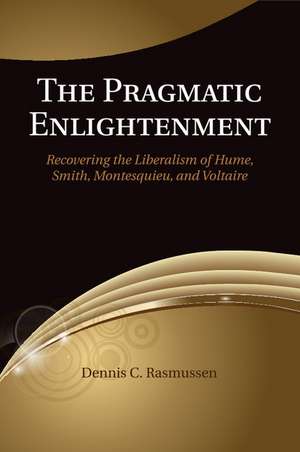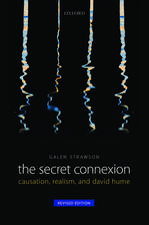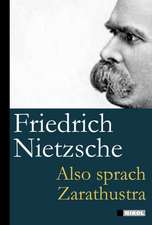The Pragmatic Enlightenment: Recovering the Liberalism of Hume, Smith, Montesquieu, and Voltaire
Autor Dennis C. Rasmussenen Limba Engleză Paperback – 29 noi 2017
| Toate formatele și edițiile | Preț | Express |
|---|---|---|
| Paperback (1) | 239.86 lei 6-8 săpt. | |
| Cambridge University Press – 29 noi 2017 | 239.86 lei 6-8 săpt. | |
| Hardback (1) | 551.61 lei 6-8 săpt. | |
| Cambridge University Press – 17 noi 2013 | 551.61 lei 6-8 săpt. |
Preț: 239.86 lei
Nou
Puncte Express: 360
Preț estimativ în valută:
45.90€ • 49.84$ • 38.56£
45.90€ • 49.84$ • 38.56£
Carte tipărită la comandă
Livrare economică 23 aprilie-07 mai
Preluare comenzi: 021 569.72.76
Specificații
ISBN-13: 9781107622999
ISBN-10: 1107622999
Pagini: 359
Dimensiuni: 153 x 230 x 20 mm
Greutate: 0.48 kg
Editura: Cambridge University Press
Colecția Cambridge University Press
Locul publicării:New York, United States
ISBN-10: 1107622999
Pagini: 359
Dimensiuni: 153 x 230 x 20 mm
Greutate: 0.48 kg
Editura: Cambridge University Press
Colecția Cambridge University Press
Locul publicării:New York, United States
Cuprins
Introduction; Part I. Hegemonic Universalism?: 1. Morality in context; 2. Pragmatic liberalism; Part II. Blind Faith in Reason?: 3. The age of the limits of reason; 4. The perils of political rationalism; Part III. Atomistic Individualism?: 5. The social and encumbered self; 6. Negative liberty for a positive community; Conclusion.
Recenzii
“Analyzed through the lenses of Hume, Smith, Montesquieu, and Voltaire, Rasmussen’s ‘pragmatic Enlightenment’ brings a welcome contribution to the recent debates on radical and moderate Enlightenment; it also invites us to reconsider the nature of liberalism and the points made by some of its critics. A thorough and superbly researched work, philosophically sensitive to the complex legacy of the Enlightenment and written with clarity and conviction, this book will be of great interest to political theorists, historians, sociologists, and philosophers.”
-- Dr. Aurelian Craiutu, Professor of Political Science, Indiana University, Bloomington
“This is an important book that is also a pleasure to read. Rasmussen is a careful scholar of Enlightenment thought, and his writing is lucid and engaging. He gives a rich and thorough account of the four authors he takes up, and convincingly refutes a series of common caricatures of the Enlightenment. Anyone interested in the period – whether friend or foe – should read this book.”
-- Dr. Samuel Fleischacker, Professor of Philosophy, University of Illinois at Chicago
“The Pragmatic Enlightenment meets the most pervasive objections to Enlightenment liberalism by showing again and again that key figures in this tradition were not only free of the vices so often attributed to them but were actually proponents of far more nuanced and defensible views than is commonly thought. None was guilty of the hegemonic universalism, the blind faith in reason, or the atomistic individualism so often associated with Enlightenment liberalism – and with contemporary liberalism as well. In the process of showing how each of these key figures eludes the common charges, Rasmussen articulates a richly reasoned defense of a powerful but moderate brand of liberalism, one that has roots in the eighteenth century but applications for today.”
-- Dr. Sharon Krause, Professor and Chair of Political Science, Brown University
-- Dr. Aurelian Craiutu, Professor of Political Science, Indiana University, Bloomington
“This is an important book that is also a pleasure to read. Rasmussen is a careful scholar of Enlightenment thought, and his writing is lucid and engaging. He gives a rich and thorough account of the four authors he takes up, and convincingly refutes a series of common caricatures of the Enlightenment. Anyone interested in the period – whether friend or foe – should read this book.”
-- Dr. Samuel Fleischacker, Professor of Philosophy, University of Illinois at Chicago
“The Pragmatic Enlightenment meets the most pervasive objections to Enlightenment liberalism by showing again and again that key figures in this tradition were not only free of the vices so often attributed to them but were actually proponents of far more nuanced and defensible views than is commonly thought. None was guilty of the hegemonic universalism, the blind faith in reason, or the atomistic individualism so often associated with Enlightenment liberalism – and with contemporary liberalism as well. In the process of showing how each of these key figures eludes the common charges, Rasmussen articulates a richly reasoned defense of a powerful but moderate brand of liberalism, one that has roots in the eighteenth century but applications for today.”
-- Dr. Sharon Krause, Professor and Chair of Political Science, Brown University
Notă biografică
Descriere
A study of the political theory of the Enlightenment, focusing on four key eighteenth-century thinkers: David Hume, Adam Smith, Montesquieu and Voltaire.

















